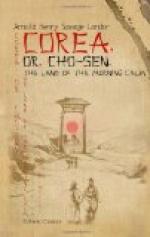The King dresses just like any other high official when the country is in mourning—that is to say, he has a long white garment with baggy sleeves, and the usual jewelled projecting belt, with the winged skull-cap; but when the land is under normal conditions, he dons a gaudy blue silk gown with dragons woven into the texture, while over his chest in a circular sort of plate a larger rampant fire-dragon is embroidered in costly silks and gold. When the latter dress is worn his cap is of similar shape to that worn when in mourning, only it is made of the finest black, instead of white, horse-hair, stiffened with varnish.
The King’s throne is simple but imposing. He sits upon three carved marble steps, covered with a valuable embroidered cloth, by the side of which, on two pillars, are two magnificent bronze vases. Behind him is a screen of masonry; for no king when in state must ever be either seen from behind, or looked down on by any one standing behind or beside him. Such an insult and breach of etiquette, especially in the latter way, would, until quite recently, probably have meant the loss of the offender’s head. Tainted, however, unfortunately with a craze for Western civilisation, the King now seldom sits on his marble throne, adorned with fine carvings of dragons and tigers, preferring to show himself sitting in a cheap foreign arm-chair with his elbow reclining on a wretched little twopence-halfpenny table covered with a green carpet. He imagines that he thus resembles a potentate of Europe! His son generally sits by his side on these occasions.
The King’s relations take no active part in politics, as they consider it unfair and beneath them, but the King, of course, does, and, judging from appearances, he seems to take a great deal of interest in his country and his people. He is constantly despatching officials on secret missions to this or that province, often in disguise, and at a moment’s notice, in order to obtain reliable information as to the state of those provinces, and the opinions of the natives regarding the magistrates appointed by him. The capital itself, too, contains practically a mass of detectives, who keep spying on everybody and one another, always ready to report the evil-doing of others, and often being caught in flagrante delicto themselves. Very often even nobles with whom I was well acquainted suddenly disappeared for days and weeks at a time, no one knowing either whither they had gone or what they were doing, except that they had left on a mission from the King. So little confidence has he in his special envoys that even when he has despatched one straight from the royal palace, with strict orders not to return home to tell his family whither he is gone, he soon after sends a second disguised messenger to look after the doings of the first, and see that he has well and faithfully carried out his orders. By the time the two have returned, some intrigue or accusations will have probably been instituted against them, in which case all the thanks they obtain for obeying His Majesty is either that they are degraded or that they are exiled to some outlandish province in the Ever White Mountain district or on the Russian frontier.




